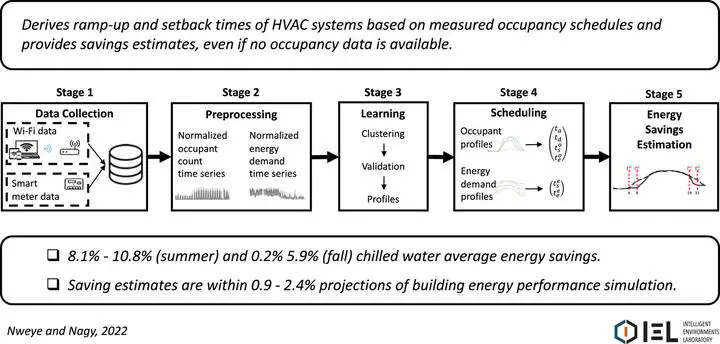New Paper: MARTINI: Smart meter driven estimation of HVAC schedules and energy savings based on Wi-Fi sensing and clustering

We have a new paper in Applied Energy led by IEL’s awesome PhD student Kingsley Nweye.
Kingsley Nweye, Zoltan Nagy, MARTINI: Smart meter driven estimation of HVAC schedules and energy savings based on Wi-Fi sensing and clustering, Applied Energy, Volume 316, 2022, 118980,
https://doi.org/10.1016/j.apenergy.2022.118980. https://www.sciencedirect.com/science/article/pii/S0306261922003890
Abstract: HVAC systems account for a significant portion of building energy use. Nighttime setback scheduling is an Energy Conservation Measure (ECM) where cooling and heating setpoints are increased and decreased respectively during unoccupied periods with the goal of obtaining energy savings. However, knowledge of a building’s real occupancy is required to maximize the success of this measure. In addition, there is the need for a scalable way to estimate energy savings potential from ECMs that is not limited by building specific parameters and experimental or simulation modeling investments. Here, we propose MARTINI, a sMARt meTer drIveN estImation of occupant-derived Heating, Ventilation and Air Conditioning (HVAC) schedules and energy savings that leverages the ubiquity of energy smart meters and Wi-Fi infrastructure in commercial buildings. We estimate the schedules by clustering Wi-Fi derived occupancy profiles and, estimate energy savings by shifting ramp-up and setback times observed in typical operational/static load profiles that are obtained by clustering smart meter energy profiles. Our case-study results with five buildings over seven months show an average of 8.1%–10.8% (summer) and 0.2%–5.9% (fall) chilled water energy savings when HVAC system operation is aligned with occupancy. We validate our method with results from Building Energy Performance Simulation (BEPS) and find that estimated average savings of MARTINI are within 0.9%–2.4% of the BEPS predictions. In the absence of occupancy information, we can still estimate potential savings from increasing ramp-up time and decreasing setback start time. In 51 academic buildings, we find savings potentials between 1%–5%. Keywords: HVAC; Occupancy; Schedule; Wi-Fi; Smart meter; Clustering; Energy simulation